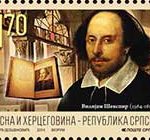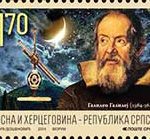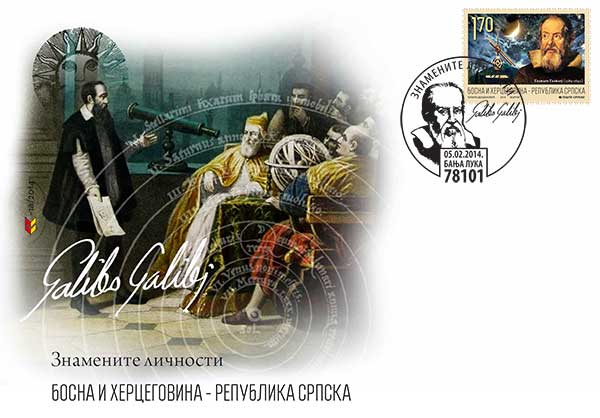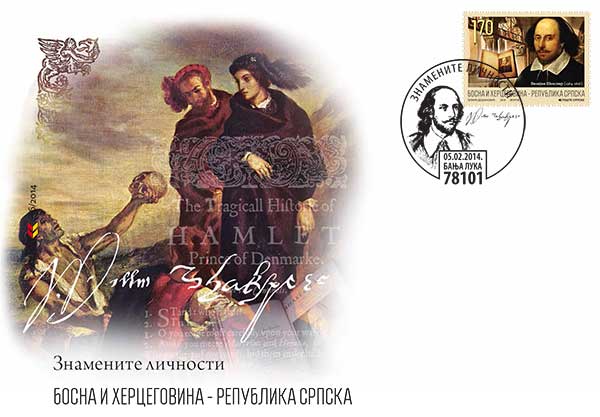Famous People
Title::Famous People
Date of Issue:05.02.2014.
Author:Djumic/Dosenovic
Type edition:commemorative
Printing techniques:multicolour offset
Sheet:8+1
Paper:muflep 100g
Printing House:Forum, Novi Sad
 Motive:Galileo Galilei
Motive:Galileo Galilei
Catalogue no.:618
Perforation:13 3/4
Face value:1.70 BAM
Quantity:15 000
 Motive:William Shakespeare
Motive:William Shakespeare
Catalogue no.:619
Perforation:13 3/4
Face value:1.70 BAM
Quantity:15 000

Galileo Galilei was an Italian mathematician, physicist, inventor, and astronomer. He was born on 15th February in 1564 in Pisa. When he was eleven, he went to the monastery Valombrosa, near Florence, where he spent the next six years, he studied grammar, rhetoric, arithmetic, and the basics of Latin and ancient Greek. As a math teacher, he worked at two universities in Pisa (1589-1592) and Padua (1592-1610).
Galileo was the first to use the method of the experiment to prove the legality of describing nature, and his achievements in physics is introduced, and the mathematical representation of size in the form of formula. Submitted by the equations of the horizontal and oblique shots, and free fall, and the first calculated the intensity of the acceleration of gravity. The list of his inventions are, among others, a thermometer, a proportional compass, hydrostatic balance and the pendulum of a clock.
At the beginning of 1609, Galileo Galilei saw sketches for "device, which helps to better see the stars and the enemy troops." Based on them, put together the best telescope that time, and - pointing it at the sky - invented his most famous invention: the telescope. With the aid of a telescope, he made a rough sketch of the lunar surface, and he was able to observe the sunspots, Saturn's rings and the phases of Venus, and determined that the Milky Way consists of a large number of stars.
In 1610 he discovered the four largest satellites of Jupiter (Io, Europe, Ganymede and Callisto). Their circulation around the largest planet in the solar system prompted Galileo to support the theory of Nicolaus Copernicus that the Earth was not the center of the universe and that the universe is not spinning around the planet. Their findings published in 1632 in his book "Dialogue of Galileo... the two main systems of the world - Ptolemy and Copernicus," in which he described the advantages of Copernicus heliocentric model compared to Ptolemy's geocentric model. This act enraged Pope Urban the Eighth, who formed the Court of the Inquisition, to which Galileo showed on 12th April 1633. A few months later, even though it gave up his teaching ( probably aware of the fact that it could befall the fate of Giordano Bruno ), the Inquisition claimed Galileo guilty and sentenced him to life imprisonment, which Pope Urban eight years later renamed to house arrest.
He died on 8th January 1642 under house arrest at Arcetri, near Florence. According to legend, his last words were: "Still it is turning around". Three and a half centuries later, 31st October 1992, Pope John Paul II publicly apologized and quashed the judgment of the Inquisition against Galileo.
Author: Nebojsa Djumic and МА Bozidar Dosenovic
Cooperation: Goran Barac, publicist from Banjaluka
Publisher: Poste Srpske a.d. Banjaluka

The exact date of birth of William Shakespeare, English poet , actor and theater director, is known, but to this day he saved his birth certificate, which is the date of baptism given 26 april in 1564. He was born in Stratford-upon- Avon, the English town and county Warwickshire, where he died 52 years later, on 23rd April in 1616.
Shakespeare is considered by many as the greatest English writer and the most famous and most performed playwright in the world. However, we know very little about his life. It is known only so much that in school he taught Latin and, most likely, left school in 1578, when his father's business began to decline. In 1582 he married eight years older Anne Hathaway, with whom he had two daughters and a son.
The earliest period of Shakespeare's literary work (1590-1600) is characterized mainly by comedies and dramas featuring in England and ancient past. Juicy, renaissance humor, exuberant literary language, and pointing out the problems in government and political machinations are characterized by extremely popular "burlesque tragedy" called "Romeo and Juliet" (1593), followed by a classic tragedy, "Titus Andronicus" (1594), the comedy "The Venetian trader" (1595), the historical drama "Henry the Fourth"(1591) and "Richard the Third" (1593).
By the early 17th century William Shakespeare laid the foundations of his great tragedies, who revived the European and world literature. Among them the most successful "Hamlet" (1602), who has been several times changed and whose text and context become one of the foundations of Western spiritual culture. Among his most important works shall include "Othello" (1604), "King Lear" (1605), "Macbeth" (1606) and "Antony and Cleopatra" (1607).
After the meteoric success of the aforementioned tragedy, in which Shakespeare entered the entire literary art and its particular lucidity, the quality of his dramatic works began inexplicably to decline. In romance "Timon of Athens" (1608), "Cimbelin" (1610), "The Winter's Tale" (1610) and "Storm" (1611) there are no tragic catharsis or memorable characters. They feel the author's resignation in life, which no happy fairy tale endings of most of these works could not conceal.
In any case, William Shakespeare is now ranked in the narrowest elite top writers. He has performed an invaluable impact on world literature, and his free spirit who was shackled by dogmas of the times in which he lived, and the whole gallery of the most diverse characters and motifs were crucially influenced by the immense popularity of the works of literary genius.
Author: Nebojsa Djumic and МА Bozidar Dosenovic
Cooperation: Goran Barac, publicist from Banjaluka
Publisher: Poste Srpske a.d. Banjaluka



